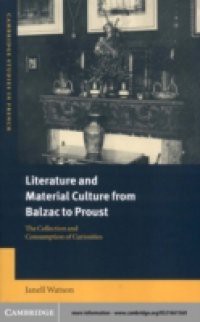This book addresses the issues of collecting, consuming, classifying and describing the curiosities, antiques and objets d'art that proliferated in French literary texts during the last decades of the nineteenth century. After Balzac made such issues significant in canonical literature, the Goncourt brothers, Huysmans, Mallarme and Maupassant celebrated their golden age. Flaubert and Zola scorned them. Rachilde and Lorrain perverted them. Proust commemorated their last moments of glory. Focusing on the bibelot (the modern French term for knick-knack, curiosity or other collectible), Janell Watson shows how the sudden prominence given to curiosities and collecting in nineteenth-century literature signals a massive change in attitudes to the world of goods, which in turn restructured the literary text according to the practical logic of daily life, calling into question established scholarly notions of order. Her study makes an important contribution to the literary history of material culture.

